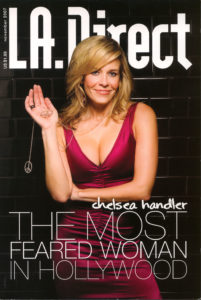Coming off the heels of seven-year success in late-night with her saucy E! Channel show “Chelsea Lately,” Chelsea Handler was a host in high demand.
“Chelsea intends to leave when her contract expires,” her manager, Irving Azoff, told Hollywood Reporter during her last season on E! in 2014. “She hired me to figure out her life after E! We have at least seven suitors and many ideas.”
Such suitors were rumored to be major networks like CBS, especially in the wake of Craig Ferguson’s disband from “The Late Late Show.”
“Netflix is looking forward to reimagining the late night talk show for the on-demand generation, starting with the late night part.” – Chief Content Officer Ted Sarandos
But instead of going the traditional route, Handler handled things her own way. On March 16, Handler took to her Instagram to announce a new late-night show to be presented on Netflix, making her the first and only female comedian to host a late-night show that airs solely online.
Here’s the announcement for my new show on Netflix. pic.twitter.com/Cqx89RkZNA
— Chelsea Handler (@chelseahandler) March 16, 2016
The pictured note reveals that the show, which is yet to be publicly titled, will air three times a week—Wednesday, Thursday, Friday—in 30 minute time slots with no commercial breaks.
“If I was going to continue working in this industry, I knew I had to do something outside the box to keep myself interested,” she told Time. “The team at Netflix is the most forward thinking, alert group I’ve sat down with in ages. No offense to the ‘Shahs of Sunset.’”
But this isn’t the first and only project on Handler’s contract with Netflix. You may have seen Handler’s four-part documentary series, “Chelsea Does,” which acted as a test-run for her new late-night talk show.
“Netflix is looking forward to reimagining the late night talk show for the on-demand generation, starting with the late night part,” Netflix Chief Content Officer Ted Sarandos said in a statement in 2014.
Sites like Hulu, Netflix, and Amazon Prime are changing the way that people around the world consume media and television.
“All the places that you’ve seen a lot of progression and diversity, that’s all been Internet: Netflix, Amazon, Hulu. Or it’s been cable stations, which have been getting more and more their share of the market: FX, TBS,” said Eliza Skinner, writer on “The Late Late Show with James Corden.”
“What you produce needs to be chopped up and watched on Youtube later and be popular there.” – Eliza Skinner, writer on “the Late Late Show with James Corden”
Indeed, more than half of all U.S. consumers and three-quarters of millennials watch films and TV shows via streaming on at least a monthly basis, according to the Deloitte Survey.
“It has helped because people are making more and more shows directed towards, like, a certain audience,” stand-up comic Erica Rhodes said. “People are starting to realize that there’s an audience for almost everything. But also they’re getting more creative with their shows. They’re taking risks; like, Amazon and Netflix are taking way more risks than just the basic networks.”
Binge-watching, which is a term coined by Twitter users after the recent success of streaming services, has become a new norm for millennials, especially, who might want more control on their show intake and are avoiding the expense of cable or a television set. Of all U.S. consumers, 70 percent are binge-watching an average of five episodes at a time, and almost one-third binge on a weekly basis, reported Deloitte.
“I think the future of late-night could be anything right now,” said Skinner. “Right now where it’s moving towards, is kind of a collection of web videos. What you produce needs to be chopped up and watched on YouTube later and be popular there.”
And if the content is popular on YouTube, James Corden says executive decision-makers must listen to that. “I think you can break boundaries down easier if something is good and it’s funny,” Corden told me in an interview after a run of his show. “I think there are amazing female comedians. I think Chelsea’s show is going to be really interesting when it launches. I think Amy Schumer’s show is great. I think Samantha Bee’s show is brilliant, like genuinely brilliant. And I think that will just continue.”
The future of paid formatting seems to be leaving television in the dust. Heading into the 21st century, the Internet’s many capabilities are rapidly changing the comedy industry for all consumers, but especially for women aspiring to comedy glory.